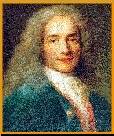|
PinkMonkey Online Study Guide-World History
5.2 The Rationalist Spirit and the Contribution of Voltaire
Owing to the discoveries in natural science there was
an attempt to seek a ’natural religion’, that is a religion based
on man’s understanding of nature, rather than on the Bible or any other
historical authority. Certain English philosophers tried to apply the
newer scientific methods to religion towards the end of the 17th century.
They were in favor of living according to ’natural law’. These men were
known as Deists.
The Deists recognized God and hence they were not atheists.
Their religious beliefs were vague, however they were definite in
their disbelief of the Bible and their denial of Christian teaching.
Deism had the following significant effects, especially
in France:
1. By destroying reverence for the church in the minds
of the upper classes, it paved the way for the religious experiments carried
out during the French Revolution.
2. Philosophers were encouraged to evolve new systems
as well as to formulate new ’laws’.
3. It cast doubts on certain religions. However, toleration
was demanded for all religions.
4. People grew increasingly indifferent to religion.
They tried to justify their indifference by using the surface arguments
of Deism.

Exhibit 5.3
A Painting of Voltaire
Francois Arovet, popularly
known as Voltaire, was the main literary exponent of Deism and
nationalism in the 18th
century. Owing to his sharp tongue and sarcastic pen he was imprisoned
for a year in the Bastille, the symbol of Bourbon tyranny. For a while
he was the idol of Paris and was favored by Frederick the Great of Germany.
He met Catherine the Great of Russia and lived in Switzerland writing
on varied topics. On becoming acquainted with English nationalism, he
greatly admired it and wrote Letters on the English. Thus he expounded
deistic philosophy, while sharply criticizing the Church and society.
Though Voltaire was not a highly original thinker, he
was a very versatile and clever writer who was called an amusing old cynic
by the ladies of Paris. He can be regarded as the intellectual dictator
of Europe at that time.
|